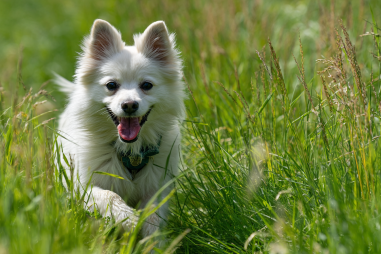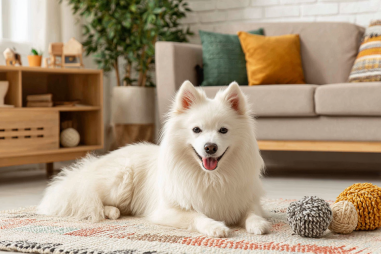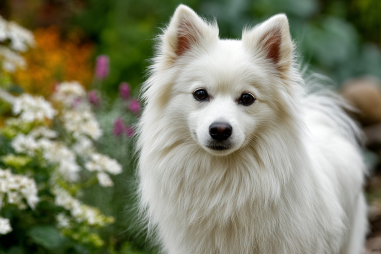The American Eskimo Dog is a charming and energetic breed that brings joy to many families. With their striking white coats and bright eyes, they are as beautiful as they are loyal. However, like all dog breeds, American Eskimo Dogs have certain health concerns that potential and current owners should be aware of. Understanding these common health issues and knowing how to prevent or manage them can significantly improve your dog’s quality of life and longevity. Staying proactive with your dog’s health care can make all the difference in keeping your furry friend vibrant and happy for years to come.
Overview of Health Risks in the Breed
American Eskimo Dogs are generally healthy, but their predisposition to some specific health conditions means owners should stay alert. These dogs, often lively and expressive, can face issues ranging from genetic disorders to joint problems that impact their mobility. Some health risks tend to appear more frequently in this breed compared to others, and early recognition can help manage symptoms more effectively. It’s important to understand that regular check-ups and a healthy lifestyle can reduce most risks, making it possible for your American Eskimo Dog to thrive.
Genetic Disorders to Watch For
One of the primary health concerns in American Eskimo Dogs involves genetic disorders. Like many purebred dogs, they can inherit conditions directly linked to their genetic makeup, which may affect their organs or neurological system. Some of the more common genetic conditions include:
- Hip Dysplasia: This is a hereditary condition where the hip joint does not fit properly, leading to arthritis or pain over time.
- Progressive Retinal Atrophy (PRA): A degenerative eye disorder that eventually causes blindness.
- Patellar Luxation: The dislocation of the kneecap, which can cause discomfort or mobility issues.
- Von Willebrand’s Disease: A bleeding disorder that affects clotting.
Reputable breeders will screen their breeding dogs for these genetic issues to decrease the likelihood of passing them to puppies. If you are adopting or purchasing an American Eskimo Dog, ask for health clearances that prove the parents were tested and free of these conditions.
Joint and Mobility Concerns
Joint health is particularly important for American Eskimo Dogs because they are active and energetic. Hip dysplasia and patellar luxation, as mentioned earlier, can restrict movement and cause long-term pain if left untreated. Additionally, some dogs may develop arthritis as they age, especially if their joints have been compromised in earlier years.
Signs of joint or mobility issues include limping, difficulty jumping or climbing stairs, stiffness after resting, and reluctance to exercise. When you notice these symptoms, prompt veterinary care is essential to diagnose the problem and start appropriate treatment. Maintaining a healthy weight through proper diet and regular exercise can also ease the strain on your dog’s joints, improving their comfort and mobility over time.
Eye and Skin Conditions
American Eskimo Dogs are also susceptible to certain eye and skin conditions. Eye problems like cataracts and Progressive Retinal Atrophy (PRA) can affect your Dog’s vision. Regular eye checkups can help detect these conditions in the early stages before significant vision loss occurs.
Regarding skin health, these dogs have thick, double coats that require regular grooming to prevent matting and skin irritation. They are prone to allergies, which may result in itchy skin, redness, or hot spots. Keeping the coat clean and well-maintained, avoiding allergens where possible, and providing a balanced diet rich in essential fatty acids can promote healthy skin.
Nutrition and Exercise Impact on Health
The foundation of a healthy American Eskimo Dog lies in proper nutrition and regular exercise. Feeding your dog a high-quality diet tailored to their age, weight, and activity level supports their overall health, immune system, and helps maintain a healthy weight. Overweight dogs are at higher risk for joint problems and other health concerns, making portion control and the right calorie balance important.
Exercise, on the other hand, helps maintain muscle tone and reduces the risk of obesity. This breed enjoys activities such as walking, running, agility games, and interactive play sessions. Consistent exercise helps not only their physical health but also mental wellbeing, preventing behavioral issues that can arise from boredom or restlessness.
Preventive Care and Regular Veterinary Visits
Prevention is key to ensuring your American Eskimo Dog stays healthy throughout their life. Regular veterinary visits allow for early detection of many health problems before they become severe. During these check-ups, vets will perform physical exams, dental checks, and may recommend vaccinations, parasite control, and screenings based on age and breed.
It’s also recommended to discuss genetic testing with your veterinarian, especially for breeding dogs, to mitigate hereditary disease risks. Establishing a routine dental care plan, grooming practices, and monitoring for unusual behaviors or symptoms all contribute to a proactive health approach.
In addition to professional care, responsible ownership practices such as providing a safe environment, grooming regularly, and learning about your dog’s needs play powerful roles in disease prevention and overall wellbeing.
Being knowledgeable about the common health concerns facing American Eskimo Dogs equips you to provide the best care possible. By staying vigilant with regular check-ups, focusing on balanced nutrition, and maintaining an active lifestyle for your dog, you can help mitigate many health risks. Embracing a proactive approach ensures that your American Eskimo Dog remains a happy, healthy companion for many delightful years ahead.







